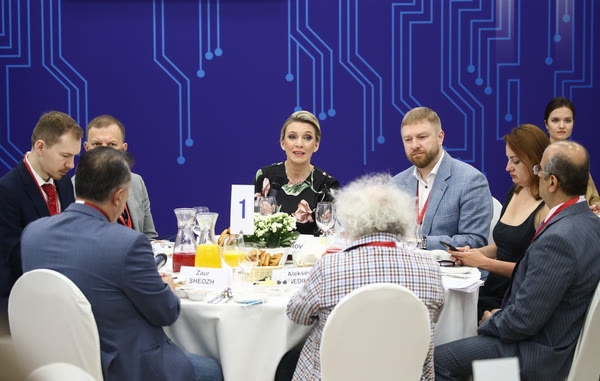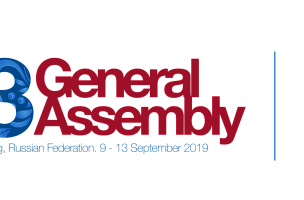KEY CONCLUSIONS
International journalists have equal opportunities in Russia. The country has shaped «a normal information environment»
«I can tell you for sure I have never heard my colleagues complain about any kind of obstacles or barriers that would hinder their work. Over many years the Foreign Correspondent Association exists, there have been dozens of trips around Russian regions. International correspondents have had all the opportunities to get information straight from the sources, as well as to see how Russian regions live, what problems they experience and how those problems get resolved,» Adib Alsayyed, Head, Foreign Correspondent Association.
«I believe a normal information environment is when you have a chance to discuss what many people deem problematic instead of talking only about the things you like,» Maria Zakharova, Director, Department of Information and the Press, Ministry of Foreign Affairs of the Russian Federation.
Russian government is ready to work with journalists of any status from any country
«Today, Russia boasts one of the biggest — if not the biggest — international media pools in the world. We are in touch with the Department of Information and Press of the Russian Ministry of Foreign Affairs to make sure we create the most favourable conditions for international correspondents... <...> Every time we contact the Ministry regarding any questions or complaints that I get as the Head of the Foreign Correspondent Association, they are addressed immediately and constructively. As a result, we see a permanent turnover in international bureaus, while more international media would like to open their bureaus in Moscow and get their journalists accredited in Russia,» Adib Alsayyed, Head, Foreign Correspondent Association.
«The Ministry of Foreign Affairs will speak with journalists and media outlets that were labelled as foreign agents, which I personally think was absolutely unfair, just like they speak with other media. I believe it is a very important standpoint,» Aleksey Venediktov, Editor in chief, «Echo of Moscow».
PROBLEMS
Vague and ambiguous interpretation of the foreign agent status in various countries
«We believed that when in 2017 the United States of America and their law enforcement system first announced their intent to label Russian media as foreign agents, it was a coincidence. We believed that it was some kind of political pressure or bullying. Honestly, we never thought they would proceed, but they did,» Maria Zakharova, Director, Department of Information and the Press, Ministry of Foreign Affairs of the Russian Federation.
«We have a popular meme and hashtag — ‘this is different’. When the President of Ukraine orders to shut down three major TV channels, this is different, because it is a fight against Russian disinformation. When Baltic states pressure and suppress Sputnik, file criminal cases and basically destroy a media agency, they are protecting their information sovereignty — this is different. When Russia tries to set the limits for certain propaganda media operating here, naturally it is an attempt to rip up the so-called freedom of speech,» Alexander Malkevich, General Director, Saint Petersburg TV Channel.
«The foreign media law was first and foremost a response to the US law and the way it was applied to Russian media in 2017. Naturally, RT was the first media outlet it was applied to. I would like to quote The Pokrovsky Gate, a famous Russian movie: „Please note it wasn’t my suggestion“. We were doing our job. RT was launched in 2005 and had some coverage in the USA. Then in 2010, we launched a cutting-edge TV channel — RT America. <...> Then after 12 years of our operation there and 7 years of being a separate US TV channel, they got to us and forced us to register as a foreign agent. Of course, all this time they have been assuring us — Department of State has been assuring us — that it will have no impact on our performance,» Anna Belkina, Deputy Editor-in-Chief; Director of Marketing & Strategic Development, RT.
Journalists with the foreign media agent status experience difficulties in their professional activity
«As for the foreign agent law, the standpoint of the European Union has been loud and clear since 2017, when it was first applied to media. <...> First of all, we believe that this law interferes with the opportunity of media outlets with the foreign agent status to work freely. This job has a negative connotation, as the term itself is a heavy burden. Secondly, we believe that in reality they experience difficulties with interviews and information, etc., so I believe it is important to put this information together and get things resolved,» Andris Kuznieks, Head of Press and Information Section, Delegation of the European Union to the Russian Federation.
«Some journalists fear they will be labelled foreign agents. Some speakers that work with those media outlets fear they will be labelled foreign agents as well and stop communicating,» Aleksey Venediktov, Editor in chief, «Echo of Moscow».
SOLUTIONS
Russia’s standpoint on the foreign agent status needs to be different from the one in the West
«If we stick to the ‘eye for eye’ principle, we all will get blind pretty soon. This is why I believe that... I understand Russia’s standpoint, that it is geopolitics, but I think Russia could lead the way in a different direction. It does not have to be the American way,» Zaur Sheozh, Moscow Bureau Chief, Aljazeera Network.
«First of all, this practice is dated. <...> Secondly, this law is poorly written, and its application... allows the Ministry of Justice to make judicial decisions without due court procedures. This is what this law does. Yes, it is the law. This is the way it was adopted, but it is bad. Thirdly, it is disgusting when journalists defend it. <...> Public officials or spokespersons can defend it. Journalists must fight for the freedom of speech everywhere, in every country. If this constraint appears in the US, or France, or Israel, or Russia, it is equally bad. <...> We need to make sure freedom of speech is not attacked in our country instead of introducing such bills and fighting for them,» Aleksey Venediktov, Editor in chief, «Echo of Moscow».
For more information, visit the ROSCONGRESS.ORG Information and Analytical System.






